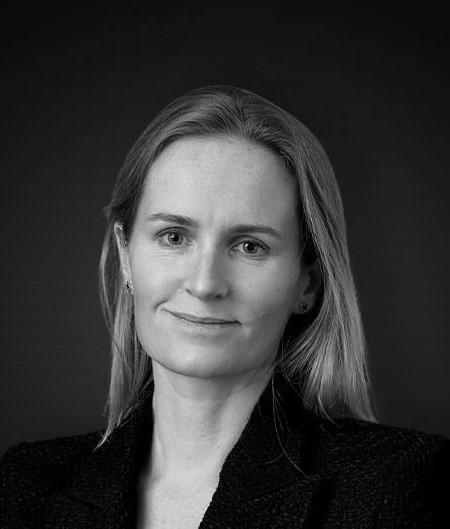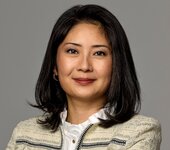
Marie-Victoire Rozé: Ode to the long game
Societe Generale Private Banking (SGBP) selects top-tier private equity managers to craft its quality offering.
For many years, SGPB has been marketing vehicles investing in funds managed by one such top-tier private equity manager: Ardian.
Please meet Marie-Victoire Rozé — Deputy Co-Head of the Secondaries & Primaries teams, Senior Managing Director and member of the ASF (Ardian Secondary Fund) Management Committee at Ardian — and an inspiring woman in many ways.
Her interview is one of the portraits of our “Woman In” dedicated to women who through their experience, personality and commitment invest their talent into all areas of the company and society.
We feel it is important to dedicate these articles to these inspiring women to highlight the diversity of their journeys and emphasise their considerable impact on society.

Marie-Victoire Rozé joined Ardian, a global leader in private investment, as an analyst in 2005. She started at the Paris office for four years, followed by 10 years in New York and London before returning to Paris in 2020.
Today Marie-Victoire is Deputy Co-Head of the Secondaries & Primaries team, Senior Managing Director and member of the Management Committee of the ASF (Ardian Secondary Fund). Ardian’s Secondaries & Primaries business currently has 97 billion dollars in assets under management. Marie-Victoire plays an important role in developing the business in Europe and Asia, and is actively involved in the origination*, execution and execution of secondary and primary investments, as well as in the origination of co-investments.
Before joining Ardian, she completed a number of internships in Paris and New York at J.P. Morgan (investment banking M&A), Keolis, Merrill Lynch (private banking) and Nike (communications). She graduated from Université Paris IX Dauphine and holds a Specialised Master's degree in finance from ESCP Business School. She also earned a Master’s degree in Law from Paris-Panthéon-Assas University.
*The origination of co-investment involves finding or sourcing co-investments.

Marceline Try, Business Development Manager
As an opener, what words or expressions would you use to describe your career and your personality?
Three words come to mind.
The first is resilience. Private equity is a long-term and demanding business; it takes stamina to go the distance. You need endurance and a fighting spirit to navigate the various stages of a career, as well as the ability to take stock in order to constantly make progress, and bounce back from more complicated situations.
Closely tied to resilience is patience. In the private equity business we are focused on a relatively long-term horizon rather than immediacy which, in a way, is a luxury. For example, originating our transactions can take several years, and this inevitably requires some patience. I think patience is also key in a career. Ambition is an excellent driver and without a doubt absolutely necessary in our industry. But you also need to accept that some things — like being promoted, for instance — can take time.
Lastly, being a good listener which, I believe, is essential for the quality of the relationships you build in both a personal and professional capacity. Our business is first and foremost about human contact, which is why for me it is absolutely vital to listen to our clients, counterparties, teams, management, as well as the portfolio managers we work with.
Building on that, what or who inspires you?
In our business, I am inspired by collective success through teamwork, but also by seeing our young talents grow, take on more responsibility and regularly achieve success.
I am also very attuned to the question of “who” inspires me. I am inspired by so many people in my life, and it’s always hard to list everyone.
Nevertheless, I can say that my close family members — my parents and my husband — are a huge source of inspiration through their journeys and experiences.
Professionally speaking, our CEO and founder , Dominique Senequier, is of course a role model for many people. Her outstanding career, the global group she has built, and her entrepreneurial spirit, energy, and leadership are all very inspiring.
What is the biggest problem facing the women of your generation?
At the risk of stating the obvious, one of the daily challenges — rather than a problem — is maintaining a work-life balance. And this is not just for women: I think it's just as much as a challenge for men, who want the same balance.
Managing both your professional life and personal life takes a lot of hard work and sacrifices, and more importantly being organised. That said, I don’t think it's realistic to succeed everywhere all the time. We have to accept that some things need to be done in their own time.
I have noticed that this issue is particularly relevant to younger generations — more so than it is to mine. It’s important to adapt to their needs and this underlying trend.
What advice would you give to young people thinking about their future career?
I would say that a career in private equity offers very exciting opportunities, but is also very demanding. Naturally, you need a solid academic background, but a very strong work ethic as well. I believe very strongly in this value.
Resilience and endurance are key in this profession, for we are playing the “long game”.
Another fundamental point, which applies to many other sectors as well, is teamwork. Success is very rarely an individual effort and almost always collective.
Lastly, I would advise young students or analysts starting their careers to build and grow their network as early as possible. And not only online through social networks by accumulating connections, but through regular meetings to establish a long-term relationship based on trust. This is the key to accessing information, investment or collaboration opportunities. The idea is that you grow with your network over the years. You are never too young to start developing your connections.



